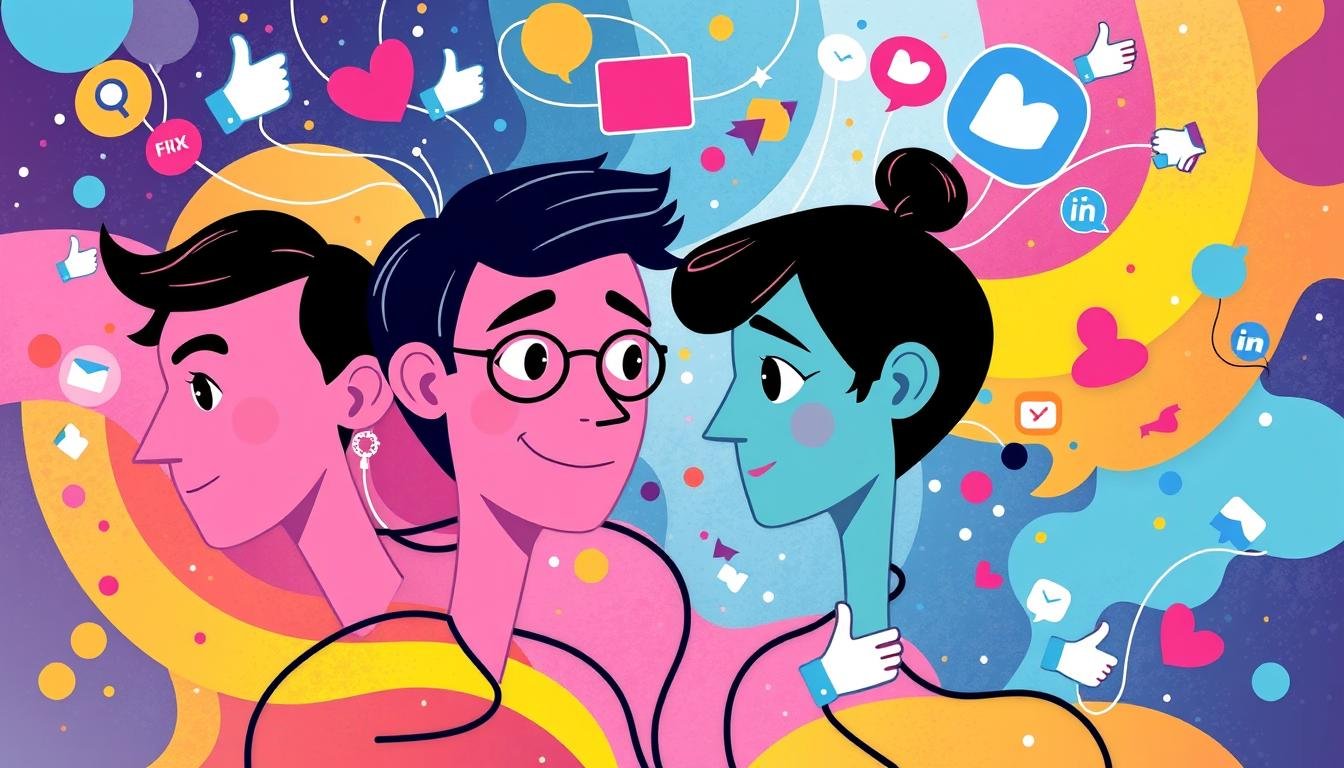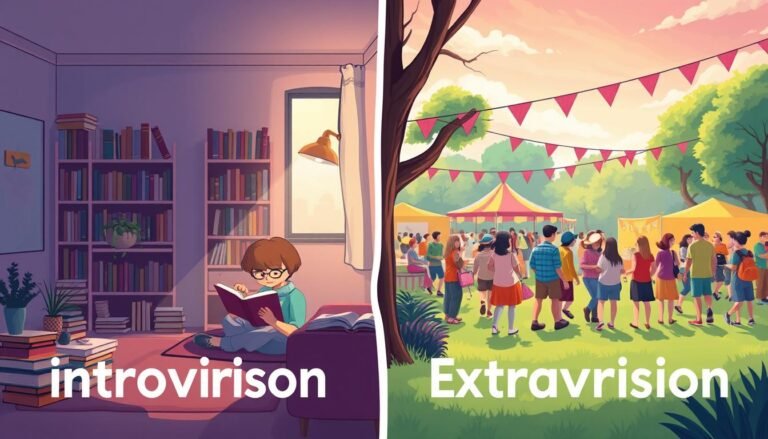Personality and Social Media Use: What to Know
Imagine you’re scrolling through your social media feed. You like posts, share memes, and comment on friends’ updates. Ever wonder why you engage with some content more than others? Or why some friends are always online while others rarely post? It might be because of your personality traits and how they shape your online behavior.
In today’s world, social media is a big part of our lives. With 3.1 billion users worldwide by 2021, sites like Facebook, Instagram, and Twitter change how we talk and connect online. But did you know your personality affects how you use these platforms?
Recent studies found a cool connection between personality and social media use. How we manage our profiles and post can show our personality. Knowing this can help us use social media better and enjoy it more.
Key Takeaways
- Personality traits significantly impact social media use and engagement
- Openness and extraversion are strong predictors of social media activity
- Conscientiousness, agreeableness, and neuroticism also influence online behavior
- Social media use can temporarily affect personality states
- Understanding your personality can help tailor your social media experience
Understanding Social Media in the 21st Century
Social media has changed how we connect and share. These platforms are now a big part of our lives. They shape how we interact online.
The Rise of Social Media Platforms
The world of social media is huge and varied. In 2024, Facebook and YouTube are the most popular. There are now 101 different social media sites for us to choose from.
Impact on Daily Life and Communication
Social media affects many parts of our lives. It helps us stay in touch with family, find support, network professionally, and get involved in politics. During the COVID-19 pandemic, more people used social media. Facebook saw more users, and TikTok’s visitors in the UK doubled.
User Demographics and Behavior
Studies show that our personalities influence how we use social media. A study in the UK found that certain traits affect why we use these platforms. For example, those who are more agreeable tend to look for online communities. People who are more open to new things focus on keeping relationships strong.
| Personality Trait | Social Media Behavior |
|---|---|
| Agreeableness | Seek virtual communities |
| Openness | Focus on relationship maintenance |
| Extraversion | Higher engagement and posting frequency |
| Neuroticism | Increased time spent scrolling |
The Big Five Personality Traits Explained
The Five Factor Model, also known as the Big Five, is a widely accepted framework for understanding personality traits. It identifies five key dimensions that shape our behavior, thoughts, and feelings.
- Openness: Curiosity and willingness to try new experiences
- Conscientiousness: Organization and goal-oriented behavior
- Extraversion: Sociability and energy in social situations
- Agreeableness: Cooperation and concern for others
- Neuroticism: Emotional stability and sensitivity to stress
Research shows these personality traits significantly impact social media use. A meta-analysis of 27 studies with 31,969 participants revealed interesting connections between personality traits and online behavior.
| Personality Trait | Relationship with Information Sharing |
|---|---|
| Extraversion | Positive (β = 0.05) |
| Agreeableness | Negative (β = -0.06) |
| Conscientiousness | Negative (β = -0.03) |
| Neuroticism | Negative (β = -0.03) |
These findings suggest that extraverts are more likely to share information on social media. On the other hand, agreeable, conscientious, and neurotic individuals tend to share less. Understanding these psychosocial factors can help explain why people interact differently on social platforms.
Personality and Social Media Use: Key Connections
Our online identity and social networking behavior often mirror our personality traits. Recent studies reveal fascinating links between individual characteristics and how we engage with social media platforms.
Extraversion and Online Engagement
Extraverts tend to be more active on social media. They share more content, interact frequently, and have larger online networks. This aligns with their outgoing nature and desire for social connection.
Neuroticism and Social Media Anxiety
People scoring high in neuroticism may experience increased anxiety from social media use. They’re more likely to seek validation through likes and comments, potentially leading to negative outcomes like eating disorders.
Openness and Content Exploration
Those high in openness are curious and adventurous online. They explore diverse content and are more likely to try new platforms. This trait correlates with higher overall social media usage.
Conscientiousness and Digital Footprint Management
Conscientious individuals are careful about their online presence. They manage their digital footprint thoughtfully, considering the long-term impact of their posts and interactions.
Agreeableness and Online Interactions
Agreeable users tend to have positive online interactions. They’re less likely to engage in conflicts and more likely to offer support to others in their network.
| Personality Trait | Relationship to Information Sharing |
|---|---|
| Extraversion | Positive (β = 0.05) |
| Agreeableness | Negative (β = −0.06) |
| Conscientiousness | Negative (β = −0.03) |
| Neuroticism | Negative (β = −0.03) |
| Openness | Inconclusive |
Understanding these connections can help users tailor their social media experience and practice effective impression management strategies online.
How Different Personality Types Navigate Social Media
Personality greatly affects how we act online and interact with social media. Studies reveal that various personality types use social media in unique ways. This shapes their online identity and how they engage with digital platforms.
Extraverts are more active on social media. A study found that 36% of extraverted individuals see social media as a good way to meet new people. This is compared to 26% of introverts. ENFPs and ESTJs (38% each) were most likely to agree, while INTJs and INTPs (14% each) were least likely.
Introverts tend to observe more. About 45% of Facebook users see themselves as observers rather than active participants. This trend is similar on Twitter, where 39% of users prefer to watch conversations unfold rather than engage directly.
People use social media differently for self-presentation. Surprisingly, about 5% of both Facebook and Twitter users adopt entirely different online personalities. This shows that some individuals use these platforms to explore alternative identities.
| Personality Type | Social Media Behavior | Percentage |
|---|---|---|
| Extraverts | View social media as good for meeting new people | 36% |
| Introverts | View social media as good for meeting new people | 26% |
| ENFPs/ESTJs | Agree social networking is good for meeting new people | 38% |
| INTJs/INTPs | Agree social networking is good for meeting new people | 14% |
| Facebook Users | See themselves as observers | 45% |
Knowing these differences can help users tailor their social media experiences. This makes online interactions more satisfying and authentic.
The Impact of Social Media on Personality States
Social media is changing how we see ourselves and behave. Studies show it can influence our online and offline actions. Let’s look at how it affects our personality and how we share ourselves online.
Temporary Changes in Personality Traits
A study of 3,411 Weibo users found something interesting. It showed that social media can predict our personality traits quite well. The model was right between 0.44 to 0.48, showing our online actions mirror our personality.
The Instagram Effect on Neuroticism and Uniqueness
Instagram can make us feel more neurotic and unique. A study of 106 young adults showed it can harm our mental health. It also made them more neurotic. This shows how complex the link between social media and our personality is.
“Social media has a significant role in raising political awareness among youth, but it also impacts their psychological well-being and personality traits.”
Our personality and social media use affect each other. Our traits guide how we use these platforms, but our online experiences can change us. This makes it important to use social media wisely to keep our digital lives balanced.
Social Media Addiction and Personality Traits
Social media addiction is a big issue today. With almost 6 billion users worldwide, it’s clear that online behavior affects our mental health. Research shows that some personality traits make us more likely to get hooked on social media.
Studies found that being outgoing and neurotic can lead to too much social media use. Outgoing people often seek online connections and excitement. Meanwhile, those who are neurotic might use social media to deal with anxiety and feeling bad about themselves.
But, being responsible can help fight social media addiction. People who are responsible tend to keep their online life in check. They find a good balance between being online and being in the real world.
“Loss of interest in offline activities is greater the more time spent online.”
Other factors also play a part in social media addiction. Feeling bad about oneself and fearing what others think can make us spend too much time online. University students, in particular, are at risk because they are often heavy users of social media.
- 55.9% of college students show a high tendency towards social media addiction
- Self-esteem plays a crucial role in moderating social media overuse
- Social anxiety and perfectionism can exacerbate addictive online behavior
It’s important to understand how personality traits and social media addiction are connected. By knowing this, we can work on controlling our online habits. This helps us live a healthier digital life.
Tailoring Your Social Media Experience to Your Personality
Creating a personalized social media experience can boost your digital well-being. Understanding your personality traits helps you craft an online identity that feels authentic and enjoyable.
Curating Content for Positive Engagement
Choose content that aligns with your interests and values. If you’re high in openness, explore diverse topics. For those with high neuroticism, limit exposure to negative news. This approach can reduce stress and increase satisfaction with your social media use.
Setting Boundaries Based on Personality Needs
Establish limits that work for you. Introverts might benefit from scheduled social media breaks. Extroverts could set reminders to engage more. Remember, 82% of users believe authentic expression on social media is key.
Leveraging Strengths and Mitigating Weaknesses
Use your personality traits to your advantage. If you’re agreeable, foster positive interactions. If you’re conscientious, organize your digital footprint. For those high in neuroticism, be mindful of negativity bias – humans tend to weigh negative information more heavily.
- 79% believe bringing fresh insights to discussions is crucial
- 87% emphasize asking engaging questions for meaningful conversations
- 70% say adding personal touches increases engagement
By tailoring your social media use to your personality, you can create a more fulfilling online experience. This personalized approach supports your digital well-being and helps you maintain a genuine online identity.
The Role of Personality in Online Self-Presentation
Personality greatly influences our digital identity and how we manage impressions online. A study with 1,075 Chinese netizens showed that extroverts share more online than introverts. This shows how personality affects our online actions and how we present ourselves.
When we use social media, we often plan what we share. We use different tactics to make a good impression. These include being friendly, promoting ourselves, showing strength, being humble, and asking for help.
- Ingratiation
- Self-promotion
- Intimidation
- Exemplification
- Supplication
Our personality and how much we value online interactions guide these tactics. How real we are online also affects how our personality shows in our online behavior.
A study on Facebook users over 18 looked at how personality affects online self-presentation. It used the Big Five Inventory to measure personality. It also looked at users’ Facebook pages for how they present themselves online.
| Online Time Spent | Percentage |
|---|---|
| 10.8% | |
| 10% | |
| Online Dating Sites | 11% of internet users |
Knowing how personality influences online self-presentation helps us shape our digital identity. It also helps us manage our online image better on different social media sites.
Conclusion
The link between personality and social media use is really interesting. Studies show our online actions are shaped by our personality. A 2021 study in the International Journal on Social and Education Sciences found openness and extraversion are key in social media use.
With 3.1 billion people using social media daily for 145 minutes, knowing these links is key for our digital health. Instagram, with 2.7 billion users, can make us more neurotic and seek uniqueness. This shows how social media can influence our personality.
As we explore the digital world, it’s vital to match our social media use to our personality. This way, we can improve our online time and keep our mental health safe. The aim is to use social media in a way that fits our personality, not to let it control who we are.
Source Links
- Temporary change in personality states among social media users: effects of Instagram use on Big Five personality states and consumers’ need for uniqueness
- The Intersection of Personality Traits and Social Media Usage: Large-Scale Representative Samples of Internet Users in Sweden
- Social Media Impact: How Social Media Sites Affect Society
- Personality and Motives for Social Media Use When Physically Distanced: A Uses and Gratifications Approach
- How big five personality traits influence information sharing on social media: A meta analysis
- The Impact of Personality Traits on Social Media Use and Engagement: An Overview | Lampropoulos
- Frontiers | The Moderating Effects of Young Adults’ Personality Traits on Social Media Immersion
- How big five personality traits influence information sharing on social media: A meta analysis
- The 12 Social Media Personality Types | Digital Tourism Think Tank
- How social media expression can reveal personality
- International Online Medical Council (IOMC)
- Social Media Addiction, Personality Factors and Fear of Negative Evaluation in a Sample of Young Adults
- Personality & Social Media: How & Who you are changes your online experience – Blog – Waypoint Wellness Center
- How to let your personality shine on social media – How To Fascinate
- Influence of personality traits on online self-disclosure: Considering perceived value and degree of authenticity separately as mediator and moderator
- Personality Differences in Social Networking and Online Self-Presentation








